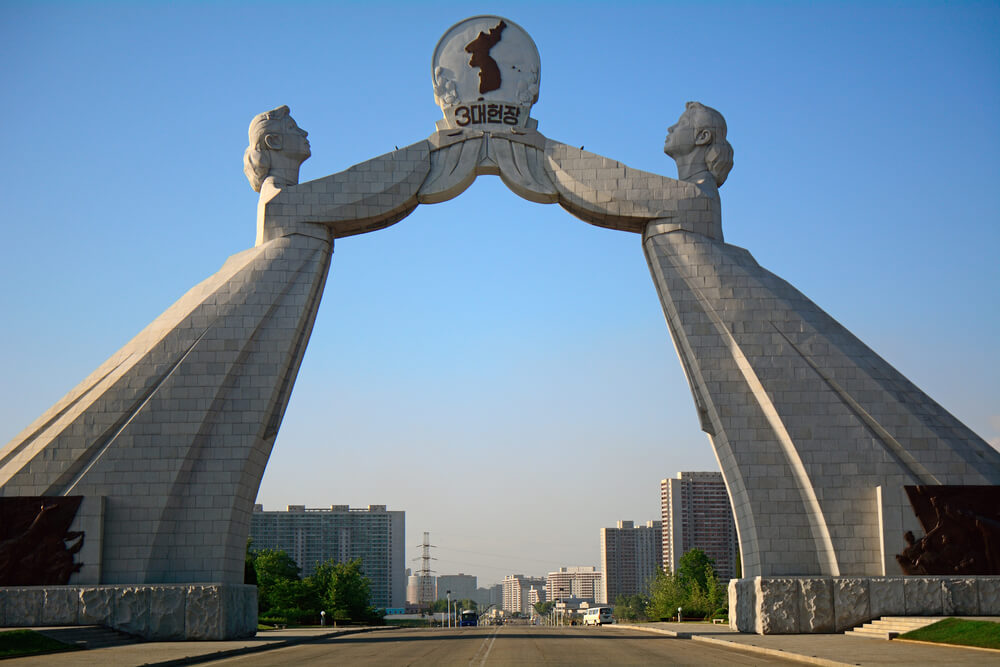North Korean leader Kim Jong Un has chosen the tactic of leading the game of raising and cooling tensions on the Korean peninsula with radical announcements.
If he wanted to draw even more attention to himself in competing with crises in other parts of the world, he succeeded at the beginning of the year.
Kim has made the possibility of war between the 2 Koreas more extreme with his recent request to abandon the project of reunification of the 2 Koreas and to amend the Constitution with the provision that South Korea is the "number one hostile state".
With this, Kim has made one of the most significant moves in his career as an autocrat. This will make him equal with his predecessors - his father and grandfather - in the eyes of his subjects.
From its very start, the Kim dynasty has cherished reunification as a supreme national goal. Reunification was viewed as the adaptation of the South to the social model prevailing in the North of the divided nation.
As unrealistic as that supreme priority was, it was one of the pillars of the communist dictatorship, the goal of which was to keep North Korea's subjects in a permanent state of unfinished business and thus subservience to the supreme power. Until now.
A step towards declaring war
Kim Jong Un's request to delete one of the national priorities is a step that would be very risky for any leader, but not for the supreme leader of North Korea.
Even though it considers renouncing the significant legacy of predecessors who have the status of demigods, this does not cause Kim any reason to worry about internal tensions.
Even though it is "only" in the form of Kim's proposal uttered before the parliament, this is a final decision.
Pyongyang abolished the few institutions dealing with cross-border issues
"The reunification of Korea can never be achieved with the Republic of Korea", was the official position after Kim's speech.
Immediately after his address, Pyongyang abolished the few institutions dealing with cross-border issues - the Committee for Peaceful Reunification, the National Economic Cooperation Bureau and the Tourism Administration.
Not without reason, Kim's move marked a new rhetoric from Pyongyang, now very close to an actual declaration of war.
Kim motivates the nation
Given that one of the principal paradigms in the relationship between the North and the South has changed, Kim's decision also represents a new escalation in the region, this time deeper and more severe than the previous ones.
But is it really a prelude to a war scenario? Many aspects point to such a development, but Kim Jong Un's regime will still refrain from taking that step.
Kim had several motives for embarking on radicalisation, the first step of which was giving up a national priority.
Kim understood the course of some significant global changes as encouragement and support to radicalise the crisis on the Korean Peninsula more strongly than before
Regardless of the unquestionable absolute control he has over the internal processes in North Korea, Kim knows that keeping his subjects in a war psychosis is one of the most powerful mechanisms for mobilising the nation.
He is sounding the alarm, hinting at war against South Korea, as a manoeuvre to cushion the infamous attempts to deploy modern advanced missiles and spy satellites over the past year.
On the other hand, Kim understood the course of some significant global changes as encouragement and support to radicalise the crisis on the Korean Peninsula more strongly than before.
Finally - a full partnership with Russia
His latest proclamation results from Kim's belief that his partnership with Russia is now finally beyond question and can be relied upon.
North Korea has become a vital arms supplier to Russia, a partner with enormous influence, which Moscow must treat with respect, including supporting Pyongyang's every move.
 Kim knows that keeping his subjects in a war psychosis is one of the most powerful mechanisms for mobilising the nation - Pyongyang Reunification Monument
Kim knows that keeping his subjects in a war psychosis is one of the most powerful mechanisms for mobilising the nation - Pyongyang Reunification Monument
North Korea will use its position to acquire advanced military technology from Russia and to strengthen its geopolitical position.
Kim sees that tensions between China and the US show no signs of easing as great encouragement for his decision. By aligning with China, along with the usual threats to the US and all of its Pacific allies, North Korea gains scope for escalation moves, which Kim has been using.
The timing of a new and even more severe radicalisation of his policy was based on the calculation that both of his leading enemies - the US and South Korea - are entering a year of significant elections.
Therefore, he reckons that the escalation he has set in motion will find opponents much less able to respond as they are focused on internal political processes.
Limited provocations, not war
Despite all the encouragement Pyongyang has been receiving, a full-scale war remains an unlikely option.
Such plans by Kim and the establishment cast a constant shadow of the destruction of the country and its leadership due to the significant disparity in military power, to the detriment of Pyongyang.
North Korea, even under the new radical political paradigm, will continue with military provocations of a limited scale
Equally important is that Kim's step in that direction would be an adventure for Beijing that it would not allow.
What is, however, more likely is that North Korea, even under the new radical political paradigm, will continue with military provocations of a limited scale and occasional limited actions towards South Korea as a way to keep the war tension high.
Kim certainly counts on the fact that he can use the attention he attracts with occasional and limited military actions as a negotiating trump card. The history of his behaviour and that of his predecessors has clearly shown the existence of such a strategy.